Orchard Selected for System Scalability & Flexibility
Joining Frontier in 2021, Dehart immediately realized the benefits that LIS training would bring to the classroom. She recognized the value of learning about laboratory integration, how interfaces work, and how the LIS is central to the laboratory’s overall workflow. Students who gain LIS experience during their training have an advantage over those who do not have that opportunity. “When I came on board in 2021, the first thing I saw was that we needed a laboratory information system so the students could see how information flows through interfaces,” Dehart said.
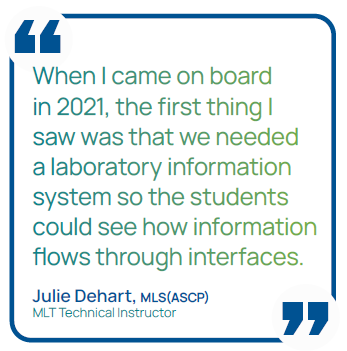 Under Dehart’s guidance, to support the MLT training program, Frontier Community College selected Orchard Harvest so students could gain hands-on experience with the LIS. Having previous experience with Orchard, Dehart and her colleagues knew firsthand that Orchard’s system would be scalable to meet the classroom’s needs. They were able to use federal grant money to help with the purchase; Frontier’s LIS went live in January 2023.
Under Dehart’s guidance, to support the MLT training program, Frontier Community College selected Orchard Harvest so students could gain hands-on experience with the LIS. Having previous experience with Orchard, Dehart and her colleagues knew firsthand that Orchard’s system would be scalable to meet the classroom’s needs. They were able to use federal grant money to help with the purchase; Frontier’s LIS went live in January 2023.
“We want our students to graduate with LIS experience so that when they get their first job, they can hit the ground running because [LIS training] is a recognized need in the industry that we’re trying to meet,” Dehart said.
In today’s laboratory environment, labs of any significant size and complexity rely heavily on their LIS for integration and workflow. Students who have LIS experience during training gain an understanding of how the LIS fits into the lab, what its benefits are, and a basic overview of LIS functionality. Fortunately for Frontier, Orchard Harvest is fulfilling this need.
“Orchard’s LIS is very user friendly and customizable. What we are teaching now is how to place orders and have the barcode print out rather than handwriting labels,” Dehart said. “It’s kind of a simple thing, but it’s also a really big thing too—to be able to demonstrate that broad use of the LIS.”
Orchard Harvest Configured Specifically for MLT School
Dehart worked with Orchard Software’s field implementation analyst to set up specific disease states that would be useful for the student curriculum. They created a database of training “patients” with teachable diseases (e.g., rheumatoid arthritis, lupus erythematosus, chronic lymphocytic leukemia, acute lymphocytic leukemia, etc.).
“Training with Orchard’s field implementation analyst was very good. Together, we developed all of the disease states and added test patient results to support those scenarios that we want the students to learn,” Dehart said.
Overcoming Challenges
Dehart said that the small number of graduates from a MLT or Medical Laboratory Scientist (MLS) program can make it hard to justify the cost.
“The programs are very much needed but don’t generate a great deal of revenue. This is a big reason programs have declined over the last decade,” explained Dehart. “Because an LIS can be expensive, many programs do not teach it; but they need to teach it. I think students are at a disadvantage if we don’t teach it in some fashion.”
Often the onus for LIS training falls on the facility where students do their clinical rotation; however, in Dehart’s experience, often students are not given LIS access for various reasons.
 100% Job Placement
100% Job Placement
Paralleling the industry lab shortage situation, critical access hospitals in the area have historically been short staffed with many laboratory professionals nearing retirement age. This has created a significant need in the area that the Frontier Community College MLT program is beginning to address.
“We have had 100% job placement since the MLT program started. Our first-year students had jobs before they even went into their second year,” Dehart said.
Looking Forward to Expanding LIS Curriculum
Looking ahead, Frontier Community College plans to continue to innovate and expand its MLT program, ensuring students are well-prepared for the evolving demands of the healthcare industry.
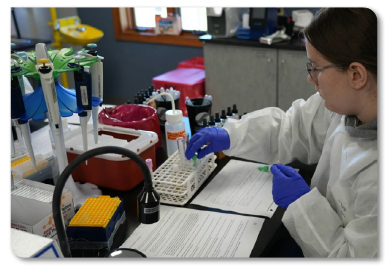 “There are a lot of things I learned [with Orchard] but haven’t had the chance to use so I’m going to need to relearn some things. But Orchard has a good support system. Every time I’ve called, they’ve been able to help me pretty quickly, so I’m confident that when I need it, I will have the support I need,” Dehart said.
“There are a lot of things I learned [with Orchard] but haven’t had the chance to use so I’m going to need to relearn some things. But Orchard has a good support system. Every time I’ve called, they’ve been able to help me pretty quickly, so I’m confident that when I need it, I will have the support I need,” Dehart said.
With the integration of Orchard Harvest, students gain critical experience in LIS usage, positioning them for success in their future careers. Despite challenges, such as program costs and limited graduate numbers, Frontier remains committed to providing high-quality education and training. The college’s partnership with Orchard Software has proven invaluable, offering strong support and customizable solutions that enhance the learning experience.
As Frontier plans to build further training around quality control and potentially expand into phlebotomy and nursing workstations, the future looks bright for its MLT program. With a track record of 100% job placement, Frontier Community College is addressing the critical need for skilled laboratory professionals and contributing to the growth and innovation in the healthcare industry.
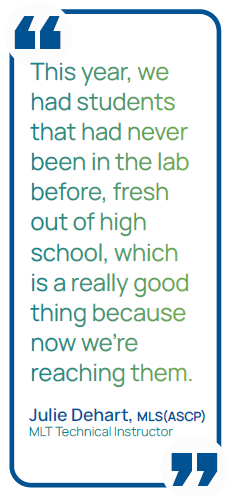
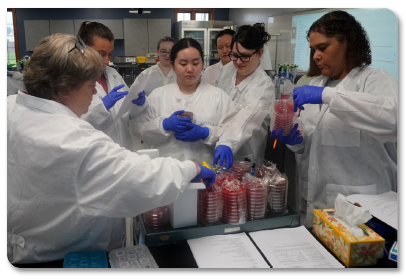 This setup enables a hands-on learning experience that includes LIS training. In addition to classroom studies, students fulfill an off-campus clinical internship.
This setup enables a hands-on learning experience that includes LIS training. In addition to classroom studies, students fulfill an off-campus clinical internship.
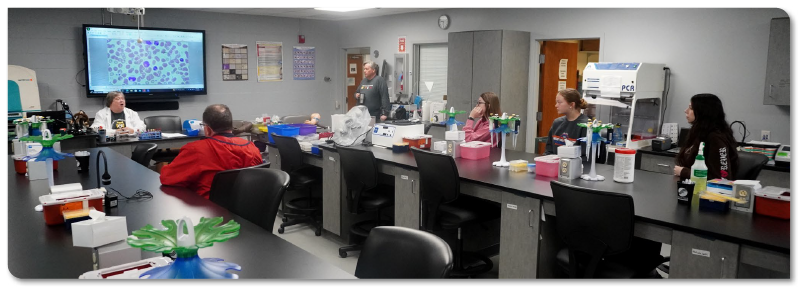
 Under Dehart’s guidance, to support the MLT training program, Frontier Community College selected Orchard Harvest so students could gain hands-on experience with the LIS. Having previous experience with Orchard, Dehart and her colleagues knew firsthand that Orchard’s system would be scalable to meet the classroom’s needs. They were able to use federal grant money to help with the purchase; Frontier’s LIS went live in January 2023.
Under Dehart’s guidance, to support the MLT training program, Frontier Community College selected Orchard Harvest so students could gain hands-on experience with the LIS. Having previous experience with Orchard, Dehart and her colleagues knew firsthand that Orchard’s system would be scalable to meet the classroom’s needs. They were able to use federal grant money to help with the purchase; Frontier’s LIS went live in January 2023. 100% Job Placement
100% Job Placement “There are a lot of things I learned [with Orchard] but haven’t had the chance to use so I’m going to need to relearn some things. But Orchard has a good support system. Every time I’ve called, they’ve been able to help me pretty quickly, so I’m confident that when I need it, I will have the support I need,” Dehart said.
“There are a lot of things I learned [with Orchard] but haven’t had the chance to use so I’m going to need to relearn some things. But Orchard has a good support system. Every time I’ve called, they’ve been able to help me pretty quickly, so I’m confident that when I need it, I will have the support I need,” Dehart said.